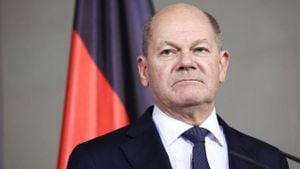Over 10,000 people demonstrated today in Hamburg against the far-right, just one day before elections. Meanwhile, neo-Nazis marched through central Berlin, clashing with counter-protesters attempting to obstruct them. The Hamburg gathering was centered around the slogan: "We will not allow ourselves to be divided. Hamburg chooses unity," targeting both the Alternative for Germany (AfD) party and the immigration policies of the Christian Union (CDU/CSU).
Protesters delivered strong messages against Germany's rightward turn: "Hate is not an alternative," "No tolerance for bigotry," and "All together against fascism." Call-to-action slogans included, "Go vote – Together for democracy!" Such protests also took place today across other cities, including Hanover and Kiel.
Contrastingly, earlier this afternoon, around 300 neo-Nazis marched through Berlin, repeatedly interrupted by about 1,200 counter-demonstrators. Police were present to maintain order and needed to intervene using pepper spray, leading to the arrests of two individuals, one of whom was identified as wanted.
On another troubling note, the motivation of a 19-year-old Syrian arrested as the suspect of Friday night’s knife attack (February 21) is reportedly rooted in "hatred for Jews," according to German authorities. The assailant, identified as Wasim M., targeted 30-year-old man at the Holocaust Memorial, as revealed by the BILD newspaper on February 22.
Details indicate the assailant conceived his attack of killing Jews for weeks, designatively choosing the crime scene. Wasim M. had arrived in Germany two years ago through Serbia as an unaccompanied minor and recently received official protective status.
Eyewitness accounts describe him attempting to slash the throat of a Spanish tourist, resulting in severe injuries to the victim who was quickly transported to the hospital for surgery and is now stable. The suspect fled but was captured three hours later, with blood on his hands and two knives, alongside the Quran and a prayer rug found in his backpack.
This surge of demonstrations and resultant violence reflects the growing tensions surrounding migration and far-right rhetoric prevalent across Germany's political and social landscapes. The intersection of these events emphasizes the challenges authorities face as they grapple with addressing extremism and maintaining public safety.
The anti-extremist outcry and violent incidents serve as both a warning and reflection of the fractious societal divide, highlighting the need for continued engagement and solutions to promote unity instead of division.



